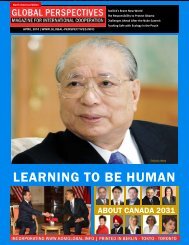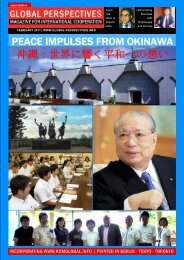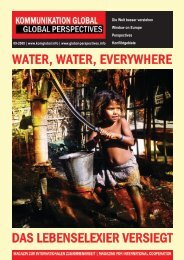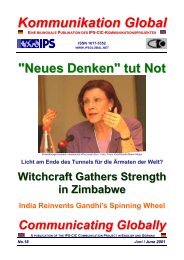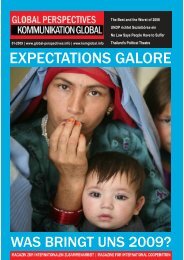GLOBAL PERSPECTIVES | Second Quarterly 2013 â North America ...
GLOBAL PERSPECTIVES | Second Quarterly 2013 â North America ...
GLOBAL PERSPECTIVES | Second Quarterly 2013 â North America ...
Create successful ePaper yourself
Turn your PDF publications into a flip-book with our unique Google optimized e-Paper software.
<strong>GLOBAL</strong> <strong>PERSPECTIVES</strong> - SECOND QUARTERLY <strong>2013</strong><br />
Many argue that the private sector, long dominated by non-<br />
Saudis, is the logical place to absorb citizen workers. To<br />
avert shocks to the system, Saudi officials implemented a<br />
penalizes those that do not. While considered a commonsense<br />
approach by many, business owners have protested<br />
what they call arbitrary standards that reduce bottom-line<br />
profits.<br />
Saudi businessmen have long complained privately about a<br />
sense of entitlement among some young Saudis. These<br />
youths, they argued, expect high salaries despite<br />
inadequate experience and avoid entry-level positions.<br />
Many lack the skills necessary to fill technical positions or<br />
don’t want to perform menial jobs. Hushed debate among<br />
business owners, government planners and intellectuals<br />
remained behind closed doors for years, but the<br />
conversation has since moved onto social-media platforms<br />
like Twitter and internet chat-rooms as well as the<br />
mainstream media.<br />
In early April, the government began cracking down on<br />
workers violating regulations requiring them to work only<br />
for their original visa sponsor, intended mostly to free up<br />
semi-skilled jobs that citizens were ostensibly willing to fill.<br />
Saudis were quickly reminded of the essential role that<br />
migrants perform in the kingdom, as news of the arrests<br />
spread and hundreds of shops, restaurants and private<br />
schools closed.<br />
While many supported the crackdown based on a rule-oflaw<br />
argument, a small but vocal minority expressed<br />
xenophobic views, using the internet not only to rally<br />
support for the crackdown but in some cases, launch<br />
campaigns vilifying specific groups of non-Saudis,<br />
especially illegal migrants who have long lived on the<br />
margins of Saudi society. Some pushing this “Saudis first”<br />
agenda portrayed illegal migrants and workers as veritable<br />
“locusts,” invading the nation and engaging in illegal<br />
activities, including organized criminal gangs, prostitution<br />
and even witchcraft.<br />
As the animus intensified, other Saudis advised their<br />
countrymen not to transfer this hostility to the millions of<br />
program called “Nitaqat,” which ranks businesses<br />
according to the percentage of Saudi nationals employed.<br />
Nitaqat rewards companies for hiring more Saudis and<br />
legal workers who have played a pivotal role in the<br />
kingdom’s development and urged Saudis to treat<br />
immigrants as guests. Among writers asking Saudis to look<br />
at themselves was Khalaf Al-Harbi in the Saudi Gazette:<br />
“The fault is within us and not within the foreign workers.”<br />
In the meantime, an estimated 800,000 Yemenis, Indians,<br />
Pakistanis and Filipinos among others deported over the<br />
past 18 months have added a truly global dimension to<br />
what Saudi authorities see as necessary measures to<br />
reduce a 12 percent unemployment rate.<br />
Officials in the home countries for some nationals voice<br />
concern about their own ability to absorb tens of<br />
thousands of people into an already tight job market, with<br />
leaders in Yemen and the Philippines acknowledging that<br />
their economies rely on overseas remittances.<br />
An already emotionally charged discourse was complicated<br />
by a number of high-profile cases of alleged abuse of<br />
foreign domestic workers by Saudi employers, along with<br />
equally troubling reports of foreign caretakers abusing or<br />
even killing children in their care.<br />
Some Saudis have even blamed Arab members of the<br />
Muslim Brotherhood who fled places like Egypt and Syria<br />
in the 1950s and 1960s of “exporting” a brand of militant<br />
Islam into the kingdom. In April a government<br />
representative reportedly told a local newspaper that<br />
imams in mosques in the Mecca region must be Saudi<br />
nationals, though prominent foreign clerics continue to<br />
preach on a number of satellite television channels.<br />
The uncertainty and panic that followed the crackdown<br />
prompted King Abdullah to issue a three-month grace<br />
period for illegal workers to rectify status. Still, difficult<br />
decisions await Saudis about the millions of non-Saudis in<br />
the country legally as the government looks to resolve high<br />
unemployment and secure work for its own youth.<br />
[IDN | June 02, <strong>2013</strong>] <br />
Credit: World Factbook<br />
- 23 -




